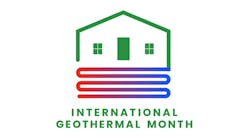Latest from Green
Sponsored
ROSEMONT, ILL. — The International Association of Plumbing and Mechanical Officials’ Green Technical Committee finalized the Green Plumbing & Mechanical Code Supplement at its meeting here in November. The Supplement is ready to be published and will be submitted for addition into the Uniform Plumbing Code and Uniform Mechanical Code in its entirety to the voluntary appendices. Some sections of the Green Supplement will be proposed to be adopted directly into the UPC and UMC.
“I sincerely hope that many of our sustainability requirements within the Green Supplement will eventually make their way into the UPC and UMC as part of our normal practices for installing and maintaining safe plumbing and HVAC systems,” said Ron Rice, member of Pipefitters Local 455, St. Paul, Minn., member of the IAPMO Board of Directors and past president of IAPMO (2006-2008).
The two day GTC meeting consisted of reviewing comments on the Green Plumbing and Mechanical Code Supplement and discussing the proposed changes to the UPC and UMC, and what are the next steps for the finalized Supplement — it is scheduled to be published February 2010.
“The purpose of this Supplement is to provide a comprehensive set of technically sound provisions that encourage sustainable practices and work towards enhancing the design and construction of plumbing and mechanical systems and result in a positive long-term environmental impact,” explained Amir Tabakh, environmental engineering director of the environmental affairs division, Department of Water and Power, City of Los Angeles, and GTC member. “This supplement is not intended to circumvent the health, safety and general welfare requirements of applicable codes. The benefits for those jurisdictions that voluntarily choose to adopt this Supplement into their codes will not only save water, but will also be more energy efficient.”
During the two-day meeting, many proposed revisions were discussed and voted on, including, but not limited to the following codes.
The GTC rejected a proposal allowing 3/8-in. PEX plumbing in a parallel or home run system if serving 1.6 GPM fixtures and all fittings are accessible. Some members were against this change because it singled out one product. However, some industry professionals attending the meeting had different opinions.
According to Sally Remedios, manager of product compliance at Delta Faucet Co., knowledge and changes in technology need to come before changing codes, therefore, 3/8-in. should be in the code.
Before the GTC voted on a code to prohibit the use of water-powered sump pumps, Bill Klaproth, Next Level, Arlington Heights, Ill., and Alan Schulman, president and CEO of Glentronics Inc., Lincolnshire, Ill., discussed the proposal.
It was Schulman’s strong concern that so much valuable water was being wasted, so that prompted the suggested code, according to Klaproth, and when Schulman looked into these pumps and how they were being installed, he realized that in many incidences no or inadequate backflow devices were being installed with the pumps, which could pose a health risk.
“Water powered sump pumps waste water and are a health risk to consumers,” explained Klaproth when discussing the proposed code at the meeting. “This green supplement is the perfect place to address water-powered sump pumps.”
The approved revision prohibits the installation of sump pumps powered by potable or reclaimed water.
The GTC also approved a code that will require potable rainwater catchment systems to be designed by a person registered, licensed or deemed competent by the Authority Having Jurisdiction to perform design work. As with many of the proposed codes, GTC members had different reasons for approving or rejecting this code.
“Just because you are an engineer doesn’t mean you can design systems,” said Robert Zimmerman, senior staff engineer of water conservation initiatives at Kohler Co. and GTC member. “These are specialized systems. There should be a certification for designing [potable rainwater catchment] systems.”
“Plumbers have installed potable water systems since ancient times,” said Philip J. Campbell, United Association training specialist, Las Vegas, and GTC member. “A plumber’s training program deals with many systems — rainwater is nothing new. Many organizations are trying to niche out a smaller area for people without as much knowledge or certification to do this job.”
According to April Trafton of Donald Dickerson Associates, a consulting firm for the engineering, construction and building codes industries, and GTC member, this doesn’t step on plumbing or engineering industries, and more people will be able to do this type of work.
Creating the Supplement
The GTC was formed January 2008, and met for the first time that April. The committee met six times and conducted many conference calls with various task groups before finalizing the Supplement for publishing.
“The fact that the Green Supplement is ready for print is truly a testimonial to all the people who volunteered their time and expertise,” said Rice. “To have a complete new document ready for print in about 20 months is a monumental achievement.”
According to Rice, the reason to create such a document was based on the “green movement” — sustainable technologies have not only been introduced, but embraced by the general public.
“I felt it was our duty to write some kind of standards to follow for being green, but also to maintain safe plumbing and mechanical systems,” explained Rice. “I think as the Green Supplement becomes available and is recognized as the premier document for "green" installations, it will surely create more job opportunities for plumbers and pipefitters within the industry.”
“As for the Green Supplement being completed, it means a great deal for me, for the IAPMO organization, the dozens of persons involved and our country because we, in this great country (USA), have been lagging in sustainability and environmentally friendly systems and construction methods as compared to other industrialized nations,” said Rodrigo Jara, director of United Association Great Lakes Training Center, Ann Arbor, Mich., and GTC member. “With the Green Supplement being made available early in 2010, our construction industry and all code enforcement entities such as township, city or state agencies, will have an instrument to guide and hopefully adopt the green supplement contents into their individual codes.”
The next GTC meeting is scheduled for April 14-15, 2010, in Rosemont, Ill. Some of the topics that may be discussed include high-efficiency plumbing fixtures, graywater systems, recycled water for flushing toilets and urinals, rainwater harvesting, high-efficiency mechanical systems (chillers, cooling towers, heat pumps, furnaces, etc.) and advanced standards.
Candace Roulo
Candace Roulo, senior editor of CONTRACTOR and graduate of Michigan State University’s College of Communication Arts & Sciences, has 15 years of industry experience in the media and construction industries. She covers a variety of mechanical contracting topics, from sustainable construction practices and policy issues affecting contractors to continuing education for industry professionals and the best business practices that contractors can implement to run successful businesses.

